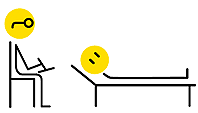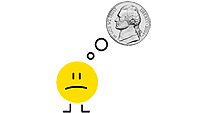Decide where to go to college
by picking two decent schools and flipping a coin.
The relatively unexamined life
is worth living. Barry Schwartz’s The Paradox of Choice documents numerous studies
in which thinking too hard about multiple choices leads people to preemptively regret the options they’re going to miss out on.
This triggers a stress reaction that tends to focus narrowly on random variables—producing unwise decisions, paralysis, and superfluous law degrees. Those who seize the first option that meets their standards (which don’t have to be low, just defined) are happier than those who insist on finding the perfect solution.
Don’t go to law school.
Lawyers are 3.6 times more
likely to be depressed than members of other professions, and it’s not just because their jobs are more stressful. For most people, job stress has little effect on happiness unless it is accompanied by a lack of control (lawyers, of course, have clients to listen to) or involves taking something away from somebody else (a common feature of the legal system).
 |
Illustrations by Knickerbocker.
|
Fire your therapist if he so much as mentions your childhood.
Contra Freud and pro common sense, much of Authentic Happiness author Martin Seligman’s research suggests
that rehashing events that enraged you long ago tends to produce depression rather
than sweet closure and relief.
If someone tells you he’s still pining for his ex, ask the ex out.
Stumbling on Happiness author Dan Gilbert is currently conducting a study designed to show that the best way to predict how much you’ll enjoy a blind date is to ask the last person to
go out with your date how much fun he had.
If you can’t decide what TV to buy, walk across the hall and ask your neighbor if he likes his.
In multiple studies, subjects felt they’d be better able to predict their reaction to an experience by imagining it, rather than hearing somebody else’s testimony. Even regarding such seemingly straightforward activities as deciding whether to eat pretzels or potato chips, they were wrong. Turns out, people are happier following advice.
 |
Illustrations by Knickerbocker.
|
Send the kids off to day care, summer camp, and boarding school.
On a day-to-day basis, caring
for children creates roughly the same level of satisfaction as washing the dishes. In fact, surveys of parents invariably find a clear dip in happiness after the Blessed Miracle of Childbirth, which continues unabated
for twenty years—bottoming out during adolescence—and only returns to pre-birth levels when the child finally leaves home.
But make sure they’re busy
once they get there.
Seligman cites research indicating that children who develop hobbies and interests besides loitering and watching TV are much more likely to be satisfied later in life.
If you go on a shopping spree, throw away the receipts.
In one study cited by both Schwartz and Gilbert, photography students were allowed to keep only one picture taken during their course. Some students were later allowed
to swap their choice for a different photo, yet those who couldn’t change were much happier. How did they deal with inflexibility? By rationalizing how much they enjoyed their new decoration.
If you’re on the fence about whether to sell your stock, sell it.
Most people predict that they’d be more unhappy if they sold
a stock that went through the roof than if they kept one
that tanked. They’re wrong—aggressive actions that go awry are mentally catalogued as valuable learning experiences.
Take the local, and don’t wait for the express.
Inaction, on the other hand, gnaws away at the mind relentlessly, like so many rats chewing on an empty Mountain Dew bottle someone dropped onto the tracks as you idly
waited for the 4. You should have just jumped on the 6.
Give up the great American novel, and start temping.
Some poor countries (China, Brazil) are happier than others, but few nations are mired in spiritually fulfilling poverty. Money, when used to feel secure about your ability to shelter
and feed yourself, can, in fact, buy happiness.
But don’t work overtime . . .
The marginal life-enhancing value of each extra dollar quickly levels off, however; hence the existence of James Bond villains and studies showing that lottery winners and Forbes 100 members are no more likely to
be satisfied than anyone else.
 |
Illustrations by Knickerbocker.
|
. . . As long as you’re content socializing within your tax bracket.
Nevertheless, being aware of
how much less money one has acquired than one’s peers is quantifiably frustrating.
Join a church, a yoga studio, an Alcoholics Anonymous group, or an underground fight club.
People who have more friends and belong to community-building groups are happier.
To paraphrase the Norm MacDonald–era “Weekend Update,” perhaps that’s the kind of finding that could have been published in the scientific journal Duh, but there it is.